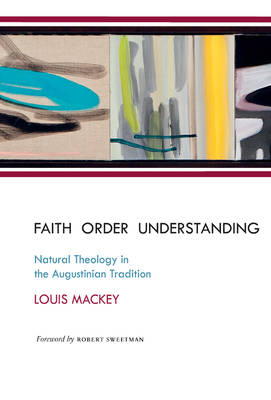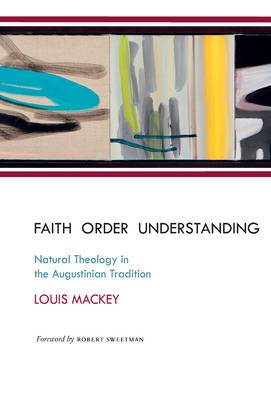
- Afhalen na 1 uur in een winkel met voorraad
- Gratis thuislevering in België vanaf € 30
- Ruim aanbod met 7 miljoen producten
- Afhalen na 1 uur in een winkel met voorraad
- Gratis thuislevering in België vanaf € 30
- Ruim aanbod met 7 miljoen producten
Zoeken
Faith Order Understanding
Natural Theology in the Augustinian Tradition
Louis Mackey
Hardcover | Engels
€ 122,45
+ 244 punten
Omschrijving
In "Faith Order Understanding," all of the late Louis Mackey's virtues are on display. His sensitivity to language and to the limits of language to bear stable meaning seems especially appropriate to the study of what is arguably the most elastic of the medieval traditions of thought, the so-called Augustinian tradition. Defining that tradition by the project of 'faith seeking understanding, ' Mackey documents this point at one of those places in any body of Christian thought where heaven and earth can be said to meet - rational reflection on the existence of God. What he makes clear is that 'not everyone who proves the existence of God is proving the same thing' and 'those who prove the existence of God do not all understand the nature of proof in the same way.' This is especially true to the variety of such reflections found in the Augustinian tradition and among its four greatest medieval representatives: Augustine, Anselm, Bonaventure, Scotus.
Specificaties
Betrokkenen
- Auteur(s):
- Uitgeverij:
Inhoud
- Aantal bladzijden:
- 194
- Taal:
- Engels
Eigenschappen
- Productcode (EAN):
- 9780888444219
- Verschijningsdatum:
- 1/03/2011
- Uitvoering:
- Hardcover
- Formaat:
- Genaaid
- Afmetingen:
- 160 mm x 236 mm
- Gewicht:
- 408 g

Alleen bij Standaard Boekhandel
+ 244 punten op je klantenkaart van Standaard Boekhandel
Beoordelingen
We publiceren alleen reviews die voldoen aan de voorwaarden voor reviews. Bekijk onze voorwaarden voor reviews.











